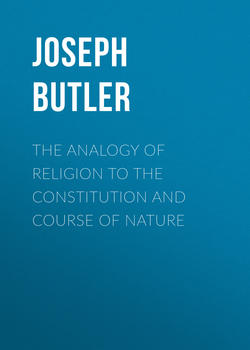Читать книгу The Analogy of Religion to the Constitution and Course of Nature - Butler Joseph, Joseph Butler - Страница 3
Conspectus of the Author’s Introduction
ОглавлениеI. What is probable evidence?
1. It differs from demonstration in that it admits of degrees; of all degrees.
1.) One probability does not beget assurance.
2.) But the slightest presumption makes a probability.
3.) The repetition of it may make certainty.
2. What constitutes probability is likeness; in regard to the event itself, or its kind of evidences, or its circumstances.
1.) This daily affords presumptions, evidence, or conviction: according as it is occasional, common, or constant.
2.) Measures our hopes and fears.
3.) Regulates our expectations as to men’s conduct.
4.) Enables us to judge of character from conduct.
3. It is an imperfect mode of judging, and adapted to beings of limited capacities.
4. Where better evidence cannot be had, it constitutes moral obligation, even though great doubts remain.
1.) We are as much bound to do what, on the whole, appears to be best, as if we knew it to be so.
2.) In questions of great moment, it is reasonable to act when the favorable chances are no greater than the unfavorable.
3.) There are numberless cases in which a man would be thought distracted if he did not act, and that earnestly, where the chances of success were greatly against him.
II. The use and application of probabilities.
Shall not go further into the nature of probable evidence, nor inquire why likeness begets presumption and conviction; nor how far analogical reasoning can be reduced to a system; but shall only show how just and conclusive this mode of reasoning is.
1. In determining our judgments and practice.
1.) There may be cases in which its value is doubtful.
2.) There may be seeming analogies, which are not really such.
3.) But as a mode of argument, it is perfectly just and conclusive.
2. In noting correspondencies between the different parts of God’s government.
1.) We may expect to find the same sort of difficulties in the Bible, as we do in Nature.
2.) To deny the Bible to be of God, because of these difficulties, requires us to deny that the world was made by him.
3.) If there be a likeness between revelation and the system of nature, it affords a presumption that both have the same author.
4.) To reason on the construction and government of the world, without settling foundation-principles, is mere hypothesis.
5.) To apply principles which are certain, to cases which are not applicable, is no better.
6.) But to join abstract reasonings to the observation of facts, and argue, from known present things, to what is likely or credible, must be right.
7.) We cannot avoid acting thus, if we act at all.
3. In its application to religion, revealed, as well as natural. This is the use which will be made of analogy in the following work. In so using it,
1.) It will be taken for proved that there is an intelligent Creator and Ruler.
– There are no presumptions against this, prior to proof.
– There are proofs: – from analogy, reason, tradition, &c.
– The fact is not denied by the generality of skeptics.
2.) No regard will be paid to those who idly speculate as to how the world might have been made and governed.
– Such prating would amount to this:
· All creatures should have been made at first as happy as they could be.
· Nothing of hazard should be put upon them.
· Should have been secured in their happiness.
· All punishments avoided.
– It is a sufficient reply to such talk that mankind have not faculties for such speculations.
3.) We are, to some extent, judges as to ends; and may conclude that Nature and Providence are designed to produce virtue and happiness; but of the means of producing these in the highest degree, we are not competent judges.
– We know not the extent of the universe;
– Nor even how one person can best be brought to perfection.
– We are not often competent to judge of the conduct of each other.
– As to God, we may presume that order will prevail in his universe; but are no judges of his modes for accomplishing this end.
4.) Instead of vainly, and perhaps sinfully, imagining schemes for God’s conduct, we must study what is.
– Discovering general laws.
– Comparing the known course of things with what revelation teaches us to expect.
III. The force of this use of Analogy.
1. Sometimes is practically equivalent to proof.
2. Confirms what is otherwise proved.
3. Shows that the system of revelation is no more open to ridicule, than the system of nature.
4. Answers almost all objections against religion.
5. To a great extent answers objections against the proofs of religion.
IV. General scope of the book.
1. The divine government is considered, as containing in it,
Chap. 1. Man’s future existence.
” 2. In a state of reward or punishment.
” 3. This according to our behavior.
” 4. Our present life probationary.
” 5. And also disciplinary.
” 6. Notwithstanding the doctrine of necessity.
” 7. Or any apparent want of wisdom or goodness.
2. Revealed religion is considered,
Chap. 1. As important.
” 2. As proved by miracles.
” 3. As containing strange things.
” 4. As a scheme imperfectly comprehended.
” 5. As carried on by a mediator.
” 6. As having such an amount of evidence as God saw fit to give.
” 7. As having sufficient and full evidence.
